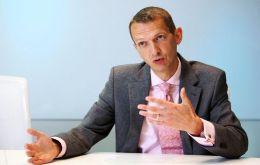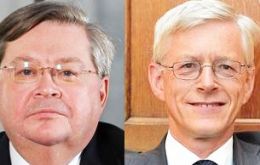MercoPress. South Atlantic News Agency
Tag: Bank of England
-
Wednesday, April 20th 2016 - 06:15 UTC
Bank of England says it has a duty to talk about the Brexit referendum

It is the Bank's duty to talk about the European Union referendum risks, argues the Bank of England governor Mark Carney, dismissing accusations the Bank is too political. The referendum takes place on 23 June and has become highly controversial.
-
Wednesday, December 2nd 2015 - 08:52 UTC
RBS and Standard Chartered, weakest in Bank of England stress test

Royal Bank of Scotland and Standard Chartered were the weakest of Britain's seven largest lenders in a Bank of England stress test. For the second year, the central bank has subjected the UK's biggest lenders to tests to measure whether they would survive a financial shock.
-
Saturday, September 19th 2015 - 07:15 UTC
UK economists debate on further interest rate cuts to combat low inflation

The Bank of England may have to cut rates to combat low inflation, rather than raise them as its next move, its chief economist Andy Haldane has said. UK inflation may not pick up in the second half of the year, and there are risks of fallout from emerging economies, he said in a speech.
-
Saturday, August 8th 2015 - 08:22 UTC
Bank of England keeps rates unchanged; little talk of rise because of China and Greece

UK interest rates have been held at 0.5% again by the Bank of England's Monetary Policy Committee (MPC). Members voted 8-1 to keep rates on hold - the first time for months the decision has not been unanimous, with Ian McCafferty voting for an increase.
-
Wednesday, August 5th 2015 - 07:25 UTC
UK government begins sale of rescued RBS, but a third below the price it paid

The British government has begun its sell-off of shares in part-nationalized lender Royal Bank of Scotland, raising £2.1bn, a third below the price it paid. It sold a 5.4% stake at 330p a share, a 7.6p discount on Monday's closing price.
-
Wednesday, June 10th 2015 - 22:22 UTC
Bank of England and Chancellor want tougher sentences for bankers' “culture of impunity”

Bank of England governor Mark Carney has called for longer prison sentences for bankers who break the law, in a speech attacking on ethics in the City. In his Mansion House speech Mr Carney said individuals acted with a “culture of impunity”. But, he warned: “The age of irresponsibility is over.”
-
Thursday, March 12th 2015 - 01:11 UTC
Bank of England contrary to further cut interest rates to combat low inflation
![It would be “extremely foolish to try to lean against this oil price fall today [and] try to provide extra stimulus to try to get inflation up at this point in time”.](/data/cache/noticias/49503/260x165/mark-carney.jpg)
Bank of England governor Mark Carney said it would be “extremely foolish” for the Bank of England to cut interest rates to try to combat low inflation. He reiterated comments made in February that the drop in prices was temporary and largely caused by the sharp fall in oil prices.
-
Friday, March 6th 2015 - 07:06 UTC
UK leaves interest rates unchanged at record low 0.5% for six years

UK interest rates have been kept unchanged again by the Bank of England, meaning they have now been at their record low of 0.5% for six years. Rates were first cut to 0.5% in March 2009 as the Bank sought to lift economic growth amid the credit crunch.
-
Friday, February 20th 2015 - 05:05 UTC
UK inflation 0.3% in January on cheaper petrol and food prices

The rate of UK Consumer Prices Index inflation fell to 0.3% in January, its lowest level since records began. Cheaper petrol and lower food prices, helped by a supermarket price war, cut the rate from 0.5% in December, Office for National Statistics figures show.
-
Monday, February 9th 2015 - 12:46 UTC
Bank of England unanimously leaves interest rates at 0.5% for the 71st month

Bank of England has held interest rates at 0.5% for the 71st month in a row and kept its stimulus programme of quantitative easing (QE) unchanged. Most forecasters now think interest rates will not rise before next year.
